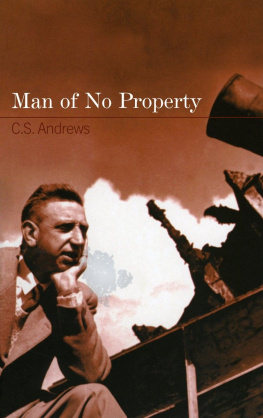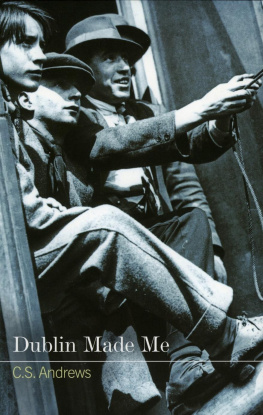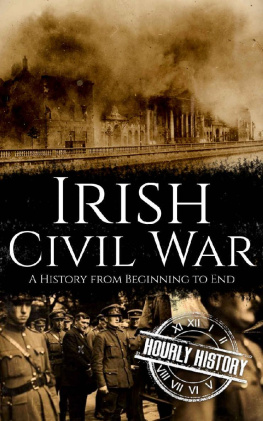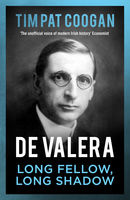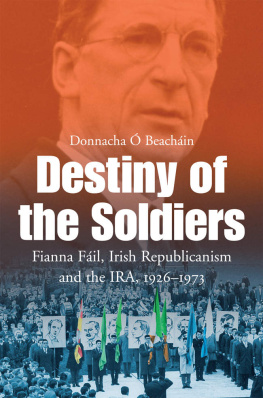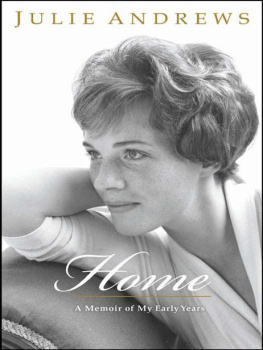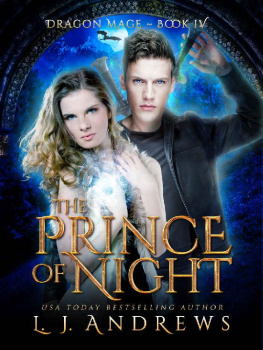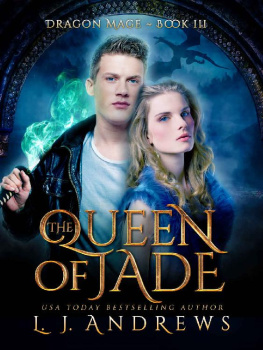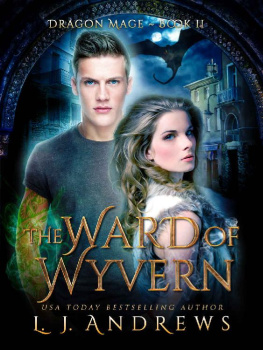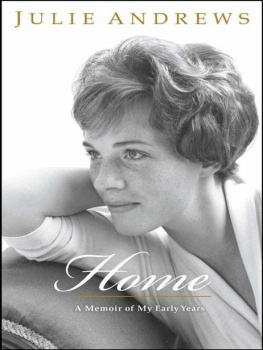Our freedom must be had at all hazards. If the men of property will not help us they must fall; we will free ourselves by the aid of that large and respectable class of the community the men of no property.
Foreword
Todd Andrews was, like many of his generation, a visionary. To me he was a giant in both a physical and a spiritual sense. He genuinely sought nothing for himself and believed passionately in the development of the public service and in the natural resources of a country with little else apart from its people. My fathers Ireland had no material wealth to offer its citizens. His generation was determined to prove we could govern ourselves, and he and his contemporaries built the foundations on which we now prosper.
He was anti-clerical, having been excommunicated from the Roman Catholic Church during the Civil War and, as he often said, was never asked back. My mother was a committed Roman Catholic (Devotions, Rosary, First Fridays etc.). There was conflict when he sometimes pleaded tiredness when we all gathered to say the Rosary. If he needed to curry favour with Mother he would join in, but inevitably fell asleep halfway through. I remember being out walking with him and one of his friends when I blessed myself passing the priests house. I got a clout on the back of the head. You dont have to bless yourself passing that ould fellas house or salute him either.
One of his oldest friends was Ewart Wilson, who would arrive halfway through Sunday dinner to be confronted by four boys and a girl involved in a rowdy debate about the political issues of the day. Ewart was conservative and gentle and it would not be long before he took his leave of my mother and fled.
At election time, it was my mother who mobilized us to lick envelopes, put up posters and hand out leaflets, but my father was the ideologue. He was often critical of Fianna Fil ministers but I never recall any criticism of Eamon de Valera.
Like most public servants, my father was genuinely a man of no property. He never sought grand things. He was a prodigious reader and was proud of his personal collections of books. He also had quite a collection of paintings. He would buy a picture because he liked it (and the artist) never because of its value. He adored the theatre and he admired the talented actors of his day. He considered films a cultural low in the world of the arts.
My father would never allow anyone to travel in the Bord na Mona or CIE-supplied car unless he was in it. There was no question of my mother shopping with the car or of any of the family being driven to school. He insisted that the company car belonged to the state and was purely for his use.
In his retirement he had more time to focus on the conflict in the North. His views were those of a republican egalitarian of the school of Wolfe Tone and I suppose we were all affected by that. He referred to the Northern Secretary as the pro-consul. He had no time for the historical revisionists and could hardly bring himself to mention the name of Conor Cruise OBrien, who, he often said, would be happy to sit in the British House of Lords.
The late John Kelly once referred to him, much to his delight, as a savage old hill-billy. Maybe he was. To me he was an icon and a very good father. Savage or not, I admired and loved him.
NIALL ANDREWS, MEP
Preface and Acknowledgments
I have already written in Dublin Made Me an account of my childhood, boyhood and early manhood as recollected in my seventies. That account covered my memories almost to my twenty-third birthday.
In it I said my reactions to the events, people and incidents described were largely based on emotion and enthusiasm. I tried to recall these events and people as I saw them at the time. I did not always succeed in this as it was sometimes impossible to prevent my mature experience obtruding into the narrative. In these further recollections written in my late seventies, the weight of years compels me to write or comment on the experiences of my life as they are now imprinted on me.
I write largely from memory, as I did in my earlier book Dublin Made Me. I again disclaim any intention of writing an historical account of the period, even of those events in public life in which this time I played a significant role. To quote Montaigne: I desire therein to be viewed as I appear in mine own genuine, simple, and ordinary manner without study and artifice: for it is myself I paint. My defects are therein to be read to the life and my imperfections and my natural form as far as public reverence hath permitted me.
I cannot pretend to have discarded my emotionalism that is a part of my genetic inheritance. I entered the period of my life with which this book begins with the emotionalism tempered by an acquired capacity to cast a cold eye on life, on death; but I did not pass by. I am conscious of the ineluctable frailty of the human condition. I am even more conscious of the impossibility of the interpretation of human motives. If I suggest in the narrative that men act thus and thus for this reason or that, I do so in the awareness of being possibly quite wrong in my interpretation, but it is how these motives and actions appear to me now.
I wish to acknowledge the assistance I got from the semi-state companies with which I was associated in my working life: Bord Filte, the Electricity Supply Board, Bord na Mna, Cras Iompair ireann, Radio Telefis ireann, and the Institute of Public Administration. I am grateful to Alf Mac Lochlainn of the National Library, who was always ready to help with information and comment, and to my friend Brian Walsh, who kindly read the completed draft and made many suggestions. My thanks are due to Mona Campbell who typed the manuscript. I am deeply indebted to Rev. P. Tuohy, who indexed the book. But above all, I am indebted to my friend and former colleague, C.B. Murphy, who edited the manuscript as it was being produced and without whose help I do not think the book would ever have been completed. Finally, I thank my wife Joyce, whose wit and wisdom helped me over many of my periods of discouragement.
Man of No Property
Aftermath of the Civil War
In the spring of 1924 I was released from internment where I had been held for a year since the end of the Civil War in what was then the Irish Free State. I was a little over twenty-two years of age.
I did not need to put pen to paper to list the assets and liabilities with which I faced the future. I am sure that I knew them. My greatest asset was my home and parents; my mother ran a creamery shop in Terenure over which we lived, my father had a small auctioneering business in Capel Street. They were prosperous businesses in a modest way. Whatever material success they attained, my parents did not change their modest but very comfortable way of life. My brother, Patrick, had joined the Free State civil service while I was away from home. This fact had not been mentioned to me in letters from home lest he be penalized because of my anti-government activities. His job added to the family income. Since he was my only and very much younger brother and we had no sister, I was the only one to be provided for. As our parents lives were totally devoted to the welfare of their two children, I felt enveloped in a cocoon of security than which no one can have a greater asset.
I had what I think was a good if academically undistinguished secondary education, thanks to the Christian Brothers. They had encouraged in me a natural curiosity, a taste for literature and a deep interest in the history of Europe and Ireland. I was interested in the theatre and the theory of drama. I liked paintings. I was, for my age and circumstances, unusually well informed even though the only intellectual equipment with which I was endowed was an exceptionally good memory. I had attended university for two terms before my career there was interrupted by arrest and imprisonment by the British. Two terms were not very long but they were sufficient to give me a taste of the pleasures of university life, though not a mature appreciation of the value of higher education. Not to have been to a university is often a source of regret, sometimes of very bitter regret, to those who have had very successful careers in business or politics or the public service.

